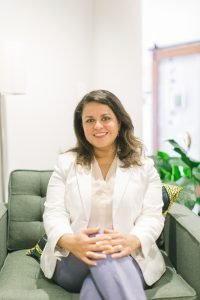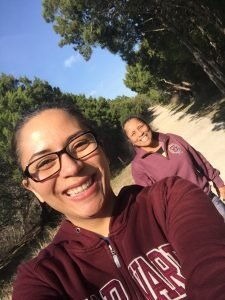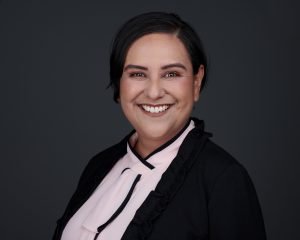by Grace Frye, Associate of Programs
In honor of Hispanic Heritage Month, we are excited to shine a light on some of our incredible Latina consultants who are a part of our provider network. This year’s Hispanic Heritage Month theme is Esperanza: A Celebration of Hispanic Heritage and Hope. With this in mind, we have chosen to focus on key moments of history, reflection, and connection with our network. We invite you to take a moment to celebrate our providers with us as they share what it means to show up for equity and bring their full authentic selves to the work.
 Ingrid Alvarado
Ingrid Alvarado
Dr. Ingrid Alvarado is the Founder and CEO of Acceleraise, an organization that specializes in fundraising, board development, and strategic consulting for nonprofits. Ingrid specializes in educational nonprofits and organizations that support Black and Brown communities.
Tell me a bit about your background. Where are you from? When and why did you choose education as your field?
I was born, raised, and educated in Belize. My mother was an undocumented immigrant from Guatemala with a second grade education. She sacrificed and prioritized my education by working in kitchens. My mami achieved her dream of owning a restaurant when I was in high school, then I scored my dream: a scholarship to attend college in America. My scholarship covered everything except room and board, which was $10,000, which is a massive amount of money for someone in Belize. My mami sold her dream so that I could have mine and the rest is history. Sometimes, all it takes is access to education for a complete shift in circumstances. This is my story.
Why do you think it’s important for education consultants from Hispanic and Latino backgrounds to bring their experiences into the work?
When a non-Latino talks about immigrants, poverty, lack of access, and being Brown, they can speak about what they have read and perhaps even observed. When I talk about these things, I can pull from lived experiences and I can empathize with my people in a different way. I work with Black and Brown-led, and Black and Brown-serving organizations for this reason. I feel connected to my work and to those I represent because of our shared, lived experiences.
What are your hopes for education in the future?
I hope that English Language Learners will have teachers who speak their language. I hope that educators will continue to have a deep empathy for Black and Brown students. I hope that pedagogy will be culturally relevant; that books will feature Black and Brown kids; that undocumented children will not be ashamed about their experiences and backgrounds. I hope that when disasters happen (such as COVID and the recent Hurricane Ida), those undocumented students can tap into government aid regardless of whether their parents have valid social security numbers so that their families, too, can have food to eat in times of hardship.
This year’s focus for Hispanic Heritage Month is Esperanza: A Celebration of Hispanic Heritage and Hope – what does that mean to you?
I am the hope that my indigenous Mayan ancestors had when they made sacrifices for their children. I work every day to live up to their expectations. I honor those who came before me. I work tirelessly serving Black and Brown organizations with the hope that one day we will be free. We will have processed the trauma of colonialism—of otherness, of oppression—and our children will thrive.
 Marcela Andrés
Marcela Andrés
Marcela Andrés is the President and CEO of designEDengagement, PBC. Founded in 2019, designEDengagement’s mission is to ensure all children have equitable access and opportunity to live out their life purpose. Marcela can be found on LinkedIn, @mycandres on Twitter, and @molcajetetalk on Instagram.
Tell me a bit about your background. Where are you from?
This question has always been so complex for me. In fifth grade, someone asked me this and my response was “I am CubAMex—Cuban American Mexican.” I am the proud daughter of immigrants who left their respective countries for a better life. My mother left Mexico due to poverty and my father left Cuba because of the communist regime. My parents had a pathway to citizenship through the amnesty program and political asylum, something I know is not true for most immigrants today. I was born in Austin, Texas and right now I am deeply saddened by our state’s response to the border crisis and how we treat immigrants. So “Where am I from?” is complex. No soy ni de aquí, ni soy de allá (“I’m neither from here nor there”) because I have roots in multiple places.
When and why did you choose education as your field?
Growing up poor, with immigrant parents, and living in a low-income, under-resourced, overlooked community, experiencing trauma, and then getting access to privilege along the way is the catalyst for why I choose to invest my time and talent into education. I went to college with the vision of getting a business degree, making a lot of money, and also wearing cute suits because most of my life I wore hand-me-downs. When I graduated from college, I entered the world of finance with a focus on insurance and was on a pathway to materialize my vision. However, I started the career pivot to education after moving to my mother’s home country. I lived in Mexico for three years and during my time there, I saw firsthand the poverty others in developing countries experience. As I returned home, I had a deep spiritual reflection on my life purpose. I could go back and open up an insurance agency or continue my journey in education. I selected the latter after stumbling across a charter network that made a bold statement—zip codes should not define destiny. When I close my eyes, I still remember walking into a classroom where a young Latina student was standing up in class and her starting sentence was, “I respectfully disagree” and then proceeded to deliver her critical thinking so eloquently. I soaked that moment in, looking around the classroom seeing all the students who looked like my classmates, and was able to see a world where each student’s life is a masterpiece that must be exhibited for the world to experience.
Why do you think it’s important for education consultants from Hispanic and Latino backgrounds to bring their experiences into the work?
We bring the spice. Our diverse cultures and lived experiences bring so much to the table. Hispanics and Latinos are very community-oriented and at the core, it is the relationships among people that will transform systems. We are great community and relationship builders.
How does your identity inspire and inform your work?
I lead with my identity and bring my full authentic self to my work.
Why do you approach centering equity in your work?
It’s a non-negotiable. If we are going to create a better world for the generations that succeed us, then we have to ensure everyone wins at this thing we call life. Equity is making sure everyone has what they need to win in life. Unfortunately, my lived experience is that while some of us are enjoying the pleasures of this life, others are being suffocated and stripped of life in both the literal sense as well as the figurative sense. And that needs to change.
This year’s focus for Hispanic Heritage Month is Esperanza: A Celebration of Hispanic Heritage and Hope – what does that mean to you?
It means embracing the rich, diverse, beautiful, colorful heritage of Hispanics, bearing witness to the challenges Hispanics and Latinos face, and embracing and taking action to create a better future.
What are your hopes for education in the future?
That we intentionally design education so that it supports all students to live a life of their fullest potential.
 Verenice Gutierrez
Verenice Gutierrez
Dr. Verenice Gutierrez is an educator, leader, and international bestselling author. She has 18 years of educational leadership experience as well as extensive experience in bilingual/ESL programming. She can be found on LinkedIn, @bilmasteac on Twitter, and online at www.drverenicegutierrez.com.
Tell me a bit about your background. Where are you from?
I was born and raised in West Texas, El Paso. I was raised bilingually, bi-culturally, and bi-nationally along the U.S./Mexico border. I am the daughter of Mexican immigrants, granddaughter, and great-granddaughter of Mexican nationals, and great-great-granddaughter of Afghani and Lebanese immigrants to Mexico.
When and why did you choose education as your field?
I chose education after attempting the corporate business world. My B.A. is in Business Administration, but business didn’t move me. I had substituted for a while and enjoyed working with students. When my younger sisters started school and I saw their needs weren’t being fully met, I fully dedicated myself to improving education.
Why do you think it’s important for education consultants from Hispanic and Latino backgrounds to bring their experiences into the work?
As Justice Sotomayor has said, I would hope that a wise Latina woman with the richness of her experiences would, more often than not, reach a better conclusion. The Latino community is not homogenous, we vary in experience and belief systems. We can bring a wealth of perspective to the work. I can speak to immigration, first-generation experience, being an ELL, and the challenges for Latinas in leadership. I bring a lens that isn’t often present in decision-making bodies that will highlight the needs of marginalized and historically under-resourced communities.
How does your identity inspire and inform your work?
My identity has evolved because of the work. The more that I learn, the more that I evolve. It has been cyclical so it’s a chicken and the egg situation. I was drawn to this work because of my lived experiences but the work helped me adapt my perspective and so on.
Why do you approach centering equity in your work?
I want to interrupt the predictability of disproportionality for historically underserved and under-resourced communities. Education must stop utilizing deficit thinking that continues to oppress historically marginalized groups. Subtractive schooling practices curtail the potential of BIPOC students.
This year’s focus for Hispanic Heritage Month is Esperanza: A Celebration of Hispanic Heritage and Hope – what does that mean to you?
I think that Latinx people are hopeful people. I have been able to reach my goals because of the hopes of my ancestors. They had dreams of better circumstances for the next generation without really knowing how that would come and/or what barriers may be encountered. Yet they hoped those dreams would become a reality.
What are your hopes for education in the future?
That it goes through a complete transformation. I would like for us to move away from the current model and innovate. We need to stop being so constrained or we will continue to get the same results we have always gotten.

